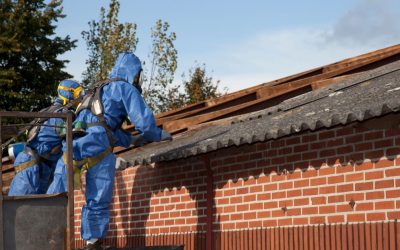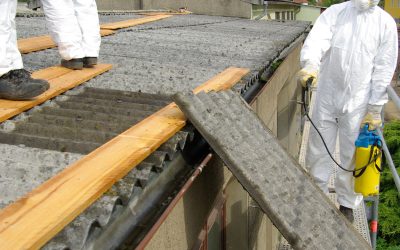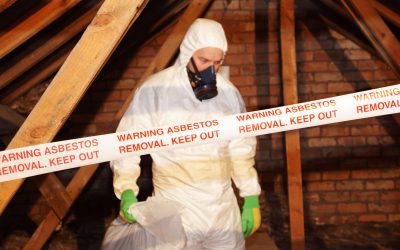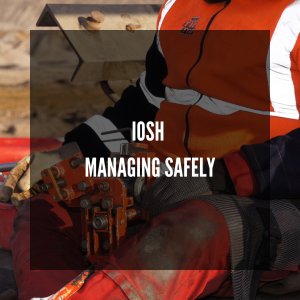Updated 08/06/2023
Asbestos, a group of naturally occurring minerals, was widely used in buildings for insulation and fireproofing until its ban in 1999 (due to the health issues it was causing). With increased focus on safety and the well-being of all workers in the UK, there has been a drive for asbestos awareness in recent years, as asbestos still lurks in many buildings across the country.
However, even with awareness and education becoming more common, asbestos still contributes to numerous illnesses every year. In this article, we will explore the different types of asbestos, its dangers, exposure routes, symptoms, and prevention measures to ensure your safety and well-being.
What is Asbestos & What Does it Look Like?
Asbestos is a group of naturally occurring minerals composed of fine, durable fibres. It was commonly used in buildings for insulation and fireproofing purposes before being banned in 1999. Therefore, if you find yourself working in a building built prior to 2000, then it is likely that asbestos will be present.
Being able to identify asbestos visually is important, as this can stop you or someone you work with from being exposed to asbestos. However, it’s important to bear in mind that there are various types of asbestos, which all vary in appearance, making it difficult to recognise.
Generally, there are certain places in buildings (constructed pre-1999) where you will likely find asbestos, such as in floor tiles, ceiling tiles, roof shingles, insulation (around boilers or pipes) and pipe cement.
Some materials will clearly mark that they contain asbestos, but in other cases, you can never be sure, and there is no list of visual identifiers that you should go by to confirm whether or not asbestos is present in a building.
If this is the case, then you should have an asbestos survey completed by a qualified company that can test for asbestos, as this substance only becomes dangerous once disturbed. Additionally, a survey will also highlight recommendations for removal and monitoring, which will allow you to make informed decisions.
Note: If you want to learn more, here are a few facts about asbestos.
What are the Different Types of Asbestos?
There are six types of asbestos: chrysotile, crocidolite, amosite, tremolite, anthophyllite and actinolite.
- Chrysotile is the most commonly used and can be found in roofs, walls and floors of many older homes and businesses. It has been found that it takes more exposure to this particular type of asbestos than any other to develop any related diseases.
- Amosite is great for heat resistance which is why it can be found in many insulation boards of older buildings.
- Crocidolite is the easiest to inhale because the fibres are so fine; hence, it has been linked to more deaths than any other type of asbestos.
- Tremolite is flexible and strong, so it can be spun and woven into cloth.
- Anthophyllite is one of the rarest forms of asbestos and is not used commercially.
- Actinolite has a harsh texture and was used in a lot of concrete materials in construction.
Why is Asbestos Dangerous?
Asbestos is a major cause of worker deaths in the UK, claiming around 5,000 lives annually. Even though it is no longer used in construction, it can still be found in older buildings, posing a significant risk to workers.
When disturbed, asbestos releases fibres that can be inhaled and cause irreversible lung damage, leading to conditions like asbestosis and mesothelioma. These diseases can take years to develop but still affect over 1,000 people each year.
Asbestos should only be handled by qualified practitioners, and employees should be trained in asbestos awareness.
How Does Asbestos Exposure Happen?
There are a few ways in which asbestos can enter your body. The primary route of entry is through inhalation of asbestos fibres in the air. You can also be dermally exposed, where fibres lodge in the skin. And lastly, asbestos can enter the body through ingestion.
Before it had been discovered that asbestos could cause severe illness, asbestos was used in thousands of products, from roofing panels to cement pipes and even car gaskets. This was due to the fact that the material was cheap, strong, and had excellent heat and sound insulation properties.
Unfortunately, the thin fibrous crystals, made up of microscopic fibrils, can be released into the air through abrasion and other means. It has therefore become a hazardous substance.
Asbestos Exposure Symptoms
If you have experienced prolonged exposure to asbestos, you may have developed asbestosis or lung cancer.
However, if you are reading this post because you are concerned that you or your team may have been exposed or might be in the future, look out for these warning signs of asbestos poisoning:
- Shortness of breath
- Swollen fingertips
- Wheezing
- Fatigue
- Persistent dry cough
How to Prevent Exposure to Asbestos
When preventing exposure to asbestos for yourself or your team, the first thing to do is ensure that everyone has been adequately trained in asbestos awareness and has the correct PPE.
Safety Services Direct offers three approved online training courses to ensure your team’s safety. Our course options include the following:
If one individual in your team has not been adequately trained, they can expose everyone else by disturbing asbestos materials. It is, therefore, crucial that everyone receives adequate training.
What professions are most at risk for asbestos exposure?
There are certain professions that have the potential to be regularly exposed to this hazardous material, while others are relatively safe.
The professions most at risk of exposure to asbestos include:
- Construction workers (e.g. builders, plumbers, electricians etc.)
- Shipyard workers
- Firefighters
- Industrial and power plant workers
- Factory workers
These manual labour-related jobs generally have a much higher likelihood of working with asbestos than other professions. However, it is important to note that the current statistic of workers who have handled asbestos and developed a related disease is approximately 20%. With increased education and awareness, this percentage can be reduced drastically.
Understand What Asbestos Is & Its Dangers?
Asbestos poses significant risks to workers, even though it is no longer used in construction. The inhalation of asbestos fibres can lead to irreversible lung damage, causing conditions like asbestosis and mesothelioma.
It is vital to be aware of the potential presence of asbestos in older buildings and take appropriate measures, such as proper training and the use of protective equipment, to prevent exposure. By prioritising safety and raising awareness, we can reduce the occurrence of asbestos-related diseases and protect those working in high-risk professions.









